Octafish
Octafish's JournalTrivializing Fukushima

Before all the tarps are up, ask: Why would the Washington Post want readers to believe "Fukushima is overrated?"
Why the Washington Post's Description of the Nuclear Disaster as “non-catastrophic” is both Callous and Erroneous
Trivializing Fukushima
by LINDA PENTZ GUNTER
CounterPunch May 01, 2012
On April 23, 2012, the editorial board of the Washington Post proclaimed that the Fukushima nuclear disaster in Japan was “non-catastrophic.” The writers eagerly promoted nuclear power while omitting inconvenient deal-breakers such as cost, waste, safety, health risks and human rights. The board taunted Germany and Japan – and the anti-nuclear movement – for looking to renewables but misrepresented Germany’s successes. They showed a shocking disregard for the suffering in Japan due to a very real catastrophe that is by no means over. And they utterly ignored those who have already paid the price for the nuclear fuel chain, like indigenous uranium miners, and its newest victims, the children of Japan whose future has been stolen.
SNIP...
WP: The Fukushima Daiichi nuclear disaster was “scary but ultimately non-catastrophic.”
FACT: The Post is writing in the past tense about an accident that is not over. The extent of radioactive contamination is still unknown and growing. Unit 4 at Fukushima Daiichi remains precarious and could cause further, and greater, harm, with its high-level radioactive waste pool on the brink of potential collapse.
To the existing human suffering in Japan will be added, over time, countless people who will sicken and die prematurely as a result of their exposure to the Fukushima radiation. In addition to cancer, likely negative health effects can include birth defects, spontaneous abortions, brain tumors, diabetes, heart disease, and genetic and teratogenic mutations. Emotional suffering should not be dismissed. The Post writers would do well to imagine their own children forbidden to play outside; evacuated hundreds of miles away; or shamed into consuming radioactively contaminated food and milk. In Japan, stress, grief and guilt have split families and entire communities apart. Farmers and fishermen have lost their livelihoods due to radiological contamination of land and sea. Thousands are being forced to accept permanent exile from their homes, jobs, friends, land and everything they once knew. With a 20km (12.4 mile) area around the stricken reactors a “dead zone” for a minimum of decades and potentially centuries, it is hard to know what more the Post editorial writers need to qualify as “catastrophic.”
CONTINUED...
http://www.counterpunch.org/2012/05/01/trivializing-fukushima/
And a PDF from BeyondNuclear.org:
http://www.beyondnuclear.org/storage/documents/Why%20the%20WP%20is%20Wrong.pdf
Move on. Move on. Further! Miles further! Uh. Forget about it!
This.
British commandos arrested in civilian clothes after shooting dead an Iraqi policeman who'd approached their car, which, for some reason, was filled with bomb-making gear. Rather than explaining it to a judge, the British sent in tanks to bust them out of jail.

Iraqi prison stormed by British tanks and helicopters
"It works the same in every country." -- Reichsmarschall Hermann Wilhelm Göring
Thank you! The Financial Crooks-n-Banksters use accounting for their frauds -- ''Control Fraud''
It's just another addition to their crooked armamentarium. Louis Francis explains:
Abstract: In his book, The Best Way to Rob a Bank is to Own One, William Black describes in detail the
complex collusion between bankers, regulators, and legislators that brought about the Savings and Loan
crisis of the 1980s and early 1990s. As part of the scheme, leverage was used to purchase bankrupt
companies that became the basis for a Ponzi-like speculative bubble that ultimately collapsed. Deceptive
accounting rules were used to hide the true state of the banks. Litigation and lobbyists were used to
delay and frustrate timely enforcement, adding significantly to the taxpayer’s bill. Since the bursting of
the S&L bubble, a number of additional financial bubbles and debacles have occurred, including Enron,
the Internet bubble, the subprime bubble, and the Madoff Ponzi scheme. The details of the S&L
crisis—civil and criminal trials and federal agency investigations—have been well-documented and will
serve as a model for later crises. This paper will describe how fraud and corruption played significant
roles in these financial crises, including the current crisis that began in 2007 and is still unfolding.
Motivation. Though “moral hazard” and “the principal agent problem” are frequently cited when
discussing the causes of the financial crisis, relatively little research has focused on the role of fraud.
This paper highlights the role of fraud and corruption in the financial crisis.
Method. We review the fraud literature with respect to past financial crises, and highlight
commonalities between some of the well-documented financial frauds of the past and the current global
financial crisis. We also support our arguments with some statistics from the current crisis that
predicted the bubble before it burst.
Results. The evidence indicates that a well-established and well-known permissive attitude towards
fraud created a global systemic risk of such significance that a financial crisis of major proportions was
all but inevitable.
Conclusions. Reinstitution of previously abandoned regulations that protected the banking system
from risk (i.e., Glass-Steagall Act) and a new commitment to SEC enforcement of already existing antifraud
laws are greatly needed. If fraud is not pursued and prosecuted, future financial crises where
fraud is a significant factor are likely to occur.
PDF with complete SOURCE: http://www.casact.org/pubs/forum/10fforumpt2/Francis.pdf
Finance is how money begets money these days. When I was younger, people built things to beget money. These things actually were used to make life, in general, better -- from cars and space ships to tractors and washing machines. Hence, the quality of life improved. Nowadays, not so much. When the Big Money boys get theirs, they move it offshore where it's safe or put it into something that makes them money -- not necessarily involve creating a single real thing. It's like Danny Dravot and Peachy Carnehan told Rudyard Kipling in John Huston's "The Man Who Would Be King":
“The less said about our professions, the better, for we have been most things in our time. We’ve been all over India, and decided it ain’t big enough for such as we: We’re going to Kaffiristan to be kings. It’s a place of war tribes, which is to say, it’s a land of opportunity for such as we, who know how to train men and lead them into battle. We’ll say to any chief we can find, ‘do you want to vanquish your foes?’ He’ll say ‘Of course!’ We’ll fight for him, make him king, then we’ll subvert that king. We’ll seize his royal throne and loot the country four ways from Sunday!” -- Danny Dravot
Wall Street's WMD of Choice Is ACCOUNTING.
American Parasite, Mitt Romney, enjoying a quick shoe shine.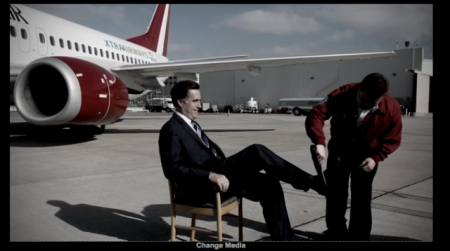
Financial control frauds' "weapon of choice" is accounting. William K. Black explains:
The Two Documents Everyone Should Read to Better Understand the Crisis
by William K. Black
Assoc. Professor, Univ. of Missouri, Kansas City;
Sr. regulator during S&L debacle
February 25, 2009 10:31 AM
As a white-collar criminologist and former financial regulator much of my research studies what causes financial markets to become profoundly dysfunctional. The FBI has been warning of an "epidemic" of mortgage fraud since September 2004. It also reports that lenders initiated 80% of these frauds.1 When the person that controls a seemingly legitimate business or government agency uses it as a "weapon" to defraud we categorize it as a "control fraud" ("The Organization as 'Weapon' in White Collar Crime." Wheeler & Rothman 1982; The Best Way to Rob a Bank is to Own One. Black 2005). Financial control frauds' "weapon of choice" is accounting. Control frauds cause greater financial losses than all other forms of property crime -- combined. Control fraud epidemics can arise when financial deregulation and desupervision and perverse compensation systems create a "criminogenic environment" (Big Money Crime. Calavita, Pontell & Tillman 1997.)
The FBI correctly identified the epidemic of mortgage control fraud at such an early point that the financial crisis could have been averted had the Bush administration acted with even minimal competence. To understand the crisis we have to focus on how the mortgage fraud epidemic produced widespread accounting fraud.
CONTINUED...
http://www.huffingtonpost.com/william-k-black/the-two-documents-everyon_b_169813.html
Accounting leaves a paper trail. So. When are the crooks going to jail? Holder? Holder?
It's not a rhetorical question.
Hate to say it, but you sound like the Lord's Avenger. Do you remember Judi Bari?
She co-founded Earth First! For her trouble saving the environment so our kids might have a planet with breathable air and drinkable water, she and colleague got car bombed. Of course, the FBI blamed her for it.
President Kennedy brought up 'de-pollution' technology.
The guy was really forward-thinking -- progressive in every way.
--In addition, I am requesting the Departments of Commerce and of Health, Education, and Welfare, to review, with representatives of the automobile industry, those changes in automobile design and equipment which will help reduce the unconscionable toll of human life on the highways and the pollution of the air we breathe. Additional legislation does not appear required at this time in view of the automobile industry's action to incorporate in the new model design changes which will reduce air pollution.
Read more at the American Presidency Project: John F. Kennedy: Special Message to the Congress on Protecting the Consumer Interest. http://www.presidency.ucsb.edu/ws/?pid=9108#ixzz1stdCFCGD
PS: Thank you for the "Plant a tree" image, Richardo. It's got to be from the mid-1920s. While I've never seen it before, it feels like something I'll never forget.
GOOGLE Abraham Bolden ...
The first African American to serve in the SS got the Treatment and then, after the assassination of President Kennedy, was railroaded into the pen for telling the truth.
http://www.democraticunderground.com/discuss/duboard.php?az=show_mesg&forum=389&topic_id=6544843&mesg_id=6545787
Secret Government: When a select few get to run things, things will benefit the select few.
Absolutely agree, sabrina1. The crew who ripped off the banks should pay in restitution of every penny.
It goes back to this:
Know your BFEE: Spawn of Wall Street and the Third Reich
Adm. Gene Laroque warned us about the Secret Government.
Secret Government is un-American.
Are you Charles Keating?
"Get Black....Kill him dead." -- Charles Keating.
Keating was sore because Bill Black busted his corruptions on Capitol Hill.
BTW: You watched the wrong video. Watch this one and you'll hear William K Black explain how Glass-Steagal worked:
WILLIAM K. BLACK: There were two really big things, under the Clinton administration. One, they got rid of the law that came out of the real-world disasters of the Great Depression. We learned a lot of things in the Great Depression. And one is we had to separate what's called commercial banking from investment banking. That's the Glass-Steagall law. But we thought we were much smarter, supposedly. So we got rid of that law, and that was bipartisan. And the other thing is we passed a law, because there was a very good regulator, Brooksley Born, that everybody should know about and probably doesn't. She tried to do the right thing to regulate one of these exotic derivatives that you're talking about. We call them C.D.F.S. And Summers, Rubin, and Phil Gramm came together to say not only will we block this particular regulation. We will pass a law that says you can't regulate. And it's this type of derivative that is most involved in the AIG scandal. AIG all by itself, cost the same as the entire Savings and Loan debacle.
Almost forgot: Please remember to post a copy of your canceled check, banned from Kos. No offense, but I don't think I'll take your word for it.
Here's what I thought when the Great Bailout of '08 was new...
Know your BFEE: Phil Gramm, the Meyer Lansky of the War Party, Set-Up the Biggest Bank Heist Ever.The Sting
In the best rip-off, the mark never knows that he or she was set up for fleecing.
In the case of the great financial meltdown of 2008, the victim is the U.S. taxpayer.
Going by the lack of analysis in Corporate McPravda, We the People are in for a royal fleecing.
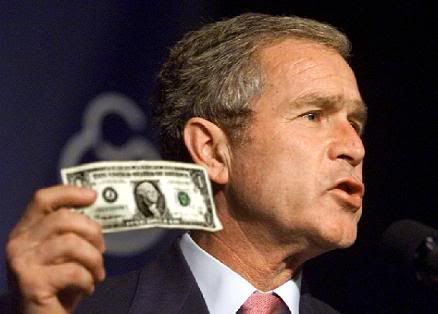
Don’t just take my word about the current situation between giant criminality and the politically connected.
[font color="green"][font size="5"]You see, there is evidence of conspiracy. An honest FBI agent warned us in 2004 about the coming financial meltdown and the powers-that-be stiffed him, too.[/font size][/font color]
The story’s below. And it’s not fiction. It is true to life.
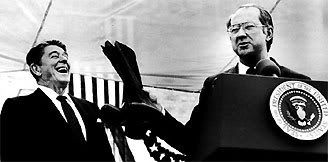
The Set-Up
You don’t have to be a fan of Paul Newman or Robert Redford to smell a BFEE rat. The oily critter’s name is Gramm. Phil Gramm. He helped Ronald Reagan push through his trickle-down fiscal policy and later helped de-regulate the nation's once-healthy Saving & Loan industry. We all know how well that worked out: Know your BFEE: They Looted Your Nation’s S&Ls for Power and Profit.
In 1999, then-super conservative Texas U.S. Senator Gramm helped pass the Gramm-Leach-Bliley Financial Services Modernization Act. This law allowed banks to act like investment houses. Using federally-guaranteed savings accounts, banks now could make risky commercial and real-estate loans.
The law should’ve been called the Gramm-Lansky Act. To those who gave a damn, it was obviously a potential disaster. During the bill’s debate, the specter of a “taxpayer bail-out” was raised by Sen. Byron Dorgan of North Dakota, warning about what had happened to the deregulated S&Ls.
Gramm wasn’t alone on the deregulation bandwagon. The law passed, IIRC, like 89-9. More than a few of my own Democratic faves went along with this deregulation, “get-government-off-the-back-of-business” law.
Today we have their love child, MOAB—for the Mother Of All Bailouts.
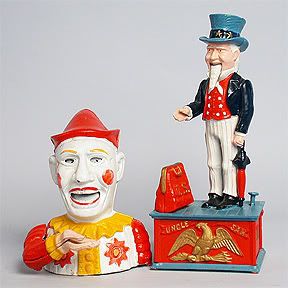
The Mark
In a sting, someone has to supply the money to be ripped off. Crooks call that person the mark or target or mope. In the present case, that’s the U.S. taxpayer.
Today’s financial crisis seems like a re-run of what happened to the Savings & Loans industry in the late 1980s. Well it is a lot like what happened to the S&Ls. Then, as now, it’s the U.S. taxpayer who gets to pick up the tab for someone else’s party.
Don’t worry, U.S. taxpayer. You’re getting something (among several things) for your $700 billion. You’re getting all the bad mortgage-based paper on almost all of Wall Street. I’d rather have penny stocks, because if there ever was something of negative value it’s the complicated notes and derivatives based on this mortgage debt.
When it comes to Bush economic policy, left holding the bag are We the People, er, Mopes. Don’t worry, it can’t get worse. As St. Ronnie would say, “Well. Yes.” You see, what the bag U.S. taxpayers hold is less than empty. It’s filled with bad debt.
The Mastermind
Chief economist amongst these merry band of thieves and traitors was one Phil Gramm (once a conservative Democrat and then an ultraconservative Republican-Taxus). An economist by training and reputation, Gramm was one of the guiding lights of Reaganomics, the cut taxes, domestic spending, and regulations while raising defense-spending to new heights. In sum, it was a fiscal policy to enrich friends – especially the kind connected to the BFEE.
Foreclosure Phil
Years before Phil Gramm was a McCain campaign adviser and a lobbyist for a Swiss bank at the center of the housing credit crisis, he pulled a sly maneuver in the Senate that helped create today's subprime meltdown.
David Corn
MotherJones.com
May 28, 2008
Who's to blame for the biggest financial catastrophe of our time? There are plenty of culprits, but one candidate for lead perp is former Sen. Phil Gramm. Eight years ago, as part of a decades-long anti-regulatory crusade, Gramm pulled a sly legislative maneuver that greased the way to the multibillion-dollar subprime meltdown. Yet has Gramm been banished from the corridors of power? Reviled as the villain who bankrupted Middle America? Hardly. Now a well-paid executive at a Swiss bank, Gramm cochairs Sen. John McCain's presidential campaign and advises the Republican candidate on economic matters. He's been mentioned as a possible Treasury secretary should McCain win. That's right: A guy who helped screw up the global financial system could end up in charge of US economic policy. Talk about a market failure.
Gramm's long been a handmaiden to Big Finance. In the 1990s, as chairman of the Senate banking committee, he routinely turned down Securities and Exchange Commission chairman Arthur Levitt's requests for more money to police Wall Street; during this period, the sec's workload shot up 80 percent, but its staff grew only 20 percent. Gramm also opposed an sec rule that would have prohibited accounting firms from getting too close to the companies they audited—at one point, according to Levitt's memoir, he warned the sec chairman that if the commission adopted the rule, its funding would be cut. And in 1999, Gramm pushed through a historic banking deregulation bill that decimated Depression-era firewalls between commercial banks, investment banks, insurance companies, and securities firms—setting off a wave of merger mania.
But Gramm's most cunning coup on behalf of his friends in the financial services industry—friends who gave him millions over his 24-year congressional career—came on December 15, 2000. It was an especially tense time in Washington. Only two days earlier, the Supreme Court had issued its decision on Bush v. Gore. President Bill Clinton and the Republican-controlled Congress were locked in a budget showdown. It was the perfect moment for a wily senator to game the system. As Congress and the White House were hurriedly hammering out a $384-billion omnibus spending bill, Gramm slipped in a 262-page measure called the Commodity Futures Modernization Act. Written with the help of financial industry lobbyists and cosponsored by Senator Richard Lugar (R-Ind.), the chairman of the agriculture committee, the measure had been considered dead—even by Gramm. Few lawmakers had either the opportunity or inclination to read the version of the bill Gramm inserted. "Nobody in either chamber had any knowledge of what was going on or what was in it," says a congressional aide familiar with the bill's history.
It's not exactly like Gramm hid his handiwork—far from it. The balding and bespectacled Texan strode onto the Senate floor to hail the act's inclusion into the must-pass budget package. But only an expert, or a lobbyist, could have followed what Gramm was saying. The act, he declared, would ensure that neither the sec nor the Commodity Futures Trading Commission (cftc) got into the business of regulating newfangled financial products called swaps—and would thus "protect financial institutions from overregulation" and "position our financial services industries to be world leaders into the new century."
Subprime 1-2-3
Don't understand credit default swaps? Don't worry—neither does Congress. Herewith, a step-by-step outline of the subprime risk betting game. —Casey Miner
CONTINUED…
http://www.motherjones.com/news/feature/2008/07/foreclo...
A fine mind for modern Bushonomics. Kill the middle class. Then, rob from the poor to give to the rich.
The Mentor
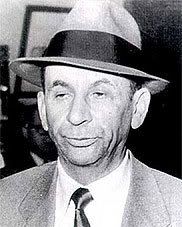
Anyone who’s ever heard him talk knows that Gramm must’ve learned all this stuff from somebody. He could never think it all up on his own. He had to have help. That’s where Meyer Lansky, the man who brought modern finance to the Mafia, comes in.
Money Laundering
Answers.com
EXCERPT...
History
Modern development
The act of "money laundering" was not invented during the Prohibition era in the United States, but many techniques were developed and refined then. Many methods were devised to disguise the origins of money generated by the sale of then-illegal alcoholic beverages. Following Al Capone's 1931 conviction for tax evasion, mobster Meyer Lansky transferred funds from Florida "carpet joints" (small casinos) to accounts overseas. After the 1934 Swiss Banking Act, which created the principle of bank secrecy, Meyer Lansky bought a Swiss bank to which he would transfer his illegal funds through a complex system of shell companies, holding companies, and offshore accounts.(1)
The term "money laundering" does not derive, as is often said, from Al Capone having used laundromats to hide ill-gotten gains. It was Meyer Lansky who perfected money laundering's older brother, "capital flight," transferring his funds to Switzerland and other offshore places. The first reference to the term "money laundering" itself actually appears during the Watergate scandal. US President Richard Nixon's "Committee to Re-elect the President" moved illegal campaign contributions to Mexico, then brought the money back through a company in Miami. It was Britain's Guardian newspaper that coined the term, referring to the process as "laundering."
Process
Money laundering is often described as occurring in three stages: placement, layering, and integration.(3)
Placement: refers to the initial point of entry for funds derived from criminal activities.
Layering: refers to the creation of complex networks of transactions which attempt to obscure the link between the initial entry point, and the end of the laundering cycle.
Integration: refers to the return of funds to the legitimate economy for later extraction.
However, The Anti Money Laundering Network recommends the terms
Hide: to reflect the fact that cash is often introduced to the economy via commercial concerns which may knowingly or not knowingly be part of the laundering scheme, and it is these which ultimately prove to be the interface between the criminal and the financial sector
Move: clearly explains that the money launderer uses transfers, sales and purchase of assets, and changes the shape and size of the lump of money so as to obfuscate the trail between money and crime or money and criminal.
Invest: the criminal spends the money: he/she may invest it in assets, or in his/her lifestyle.
CONTINUED...
http://www.answers.com/topic/money-laundering
The great journalist Lucy Komisar has shone a big light on the subject:
Offshore Banking
The U.S.A.’s Secret Threat
Lucy Komisar
The Blacklisted Journalist
June 1, 2003
EXCERPT…
In 1932, mobster Meyer Lansky took money from New Orleans slot machines and shifted it to accounts overseas. The Swiss secrecy law two years later assured him of G-man-proof banking. Later, he bought a Swiss bank and for years deposited his Havana casino take in Miami accounts, then wired the funds to Switzerland via a network of shell and holding companies and offshore accounts, some of them in banks whose officials knew very well they were working for criminals. By the 1950s, Lansky was using the system for cash from the heroin trade.
Today, offshore is where most of the world's drug money is laundered, estimated at up to $500 billion a year, more than the total income of the world's poorest 20 percent. Add the proceeds of tax evasion and the figure skyrockets to $1 trillion. Another few hundred billion come from fraud and corruption.
Lansky laundered money so he could pay taxes and legitimate his spoils. About half the users of offshore have opposite goals. As hotel owner and tax cheat Leona Helmsley said---according to her former housekeeper during Helmsley's trial for tax evasion---"Only the little people pay taxes." Rich individuals and corporations avoid taxes through complex, accountant-aided schemes that routinely use offshore accounts and companies to hide income and manufacture deductions.
The impact is massive. The IRS estimates that taxpayers fail to pay in excess of $100 billion in taxes annually due on income from legal sources. The General Accounting Office says that American wage-earners report 97 percent of their wages, while self-employed persons report just 11 percent of theirs. Each year between 1989 and 1995, a majority of corporations, both foreign- and U.S.-controlled, paid no U.S. income tax. European governments are fighting the same problem. The situation is even worse in developing countries.
The issue surfaces in the press when an accounting scam is so outrageous that it strains credulity. Take the case of Stanley Works, which announced a "move" of its headquarters-on paper-from New Britain, Connecticut, to Bermuda and of its imaginary management to Barbados. Though its building and staff would actually stay put, manufacturing hammers and wrenches, Stanley Works would no longer pay taxes on profits from international trade. The Securities and Exchange Commission, run by Harvey Pitt---an attorney who for more than twenty years represented the top accounting and Wall Street firms he was regulating---accepted the pretense as legal.
"The whole business is a sham," fumed New York District Attorney Robert Morgenthau, who more than any other U.S. law enforcer has attacked the offshore system. "The headquarters will be in a country where that company is not permitted to do business. They're saying a company is managed in Barbados when there's one meeting there a year. In the prospectus, they say legally controlled and managed in Barbados. If they took out the word legally, it would be a fraud. But Barbadian law says it's legal, so it's legal." The conceit apparently also persuaded the Securities and Exchange Commission.
CONTINUED…
http://www.bigmagic.com/pages/blackj/column92e.html
Socialize the risk for Wall Street. Privatize the loss to Uncle Sam’s nieces and nephews. Congratulations, Dear Reader! Now you know as much as Phil Gramm.
The Diversion
Still, a global financial meltdown sounds like something bad. Making things worse, we’re hearing that Uncle Sam is broke! Flat busted. Tapped out.
That’s odd, though. We the People see the Treasury being emptied with tax breaks for the wealthy and checks to the companies they own that make money off of war. Want to know how to make a buck these days? Invest in the likes of Halliburton and Northrup Grumman. Anything in the warmongering business connected to Bush and his cronies will weather the downturn or depression.
The Wall Street Journal -- a paper owned and operated by Fox News’ head, Rupert Murdoch – was very quick to promote the crisis, as DUer JustPlainKathy observed. The paper was even faster to pounce on a solution: What’s needed is a safety net for banks. And quick as a wink, they found the answer!
Only the U.S. taxpayer has the wherewithal to prevent the collapse of the global financial system -- a global economic meltdown that would freeze up credit and investment and expansion and prosperity and a return to the Great Depression. Who can be against that?
Oh. Kay. Sounds about right – Rupert the Alien agreeing with what Leona Helmsley said: “Only the little people pay taxes.”
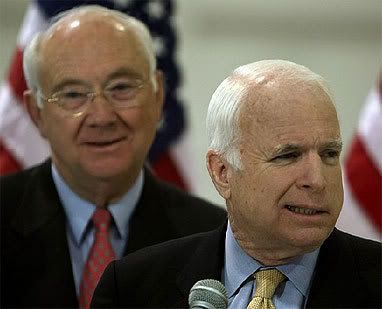
Gramm and McCain also are in favor of privatization. How nice is that?
The Getaway
George Walker Bush and his right-wing pals feel they can get away with this, their latest rip-off the American taxpayers. Who can blame them? When compared to their clear record of incompetence, lies, fraud, theft, mass-murder, warmongering and treason, what’s a few trillion dollar rip-off?

Still, it's weird how they act.
They must really think they’ll be welcomed with open arms in Paraguay and Dubai and Switzerland.
Going by the welcome the world gave the Shah of Iran, they’re in for a big surprise.
The FBI Guy
Don’t say we weren’t warned. An intrepid FBI agent with something sorely lacking in the rest of the Bush administration, integrity, blew the whistle on the bank thing…
FBI saw threat of mortgage crisis
A top official warned of widening loan fraud in 2004, but the agency focused its resources elsewhere.
By Richard B. Schmitt
Los Angeles Times Staff Writer
August 25, 2008
WASHINGTON — Long before the mortgage crisis began rocking Main Street and Wall Street, a top FBI official made a chilling, if little-noticed, prediction: The booming mortgage business, fueled by low interest rates and soaring home values, was starting to attract shady operators and billions in losses were possible.
"It has the potential to be an epidemic," Chris Swecker, the FBI official in charge of criminal investigations, told reporters in September 2004. But, he added reassuringly, the FBI was on the case. "We think we can prevent a problem that could have as much impact as the S&L crisis," he said.
Today, the damage from the global mortgage meltdown has more than matched that of the savings-and-loan bailouts of the 1980s and early 1990s. By some estimates, it has made that costly debacle look like chump change. But it's also clear that the FBI failed to avert a problem it had accurately forecast.
Banks and brokerages have written down more than $300 billion of mortgage-backed securities and other risky investments in the last year or so as homeowner defaults leaped and weakness in the real estate market spread.
SNIP…
Most observers have declared the mess a gross failure of regulation. To be sure, in the run-up to the crisis, market-oriented federal regulators bragged about their hands-off treatment of banks and other savings institutions and their executives. But it wasn't just regulators who were looking the other way. The FBI and its parent agency, the Justice Department, are supposed to act as the cops on the beat for potentially illegal activities by bankers and others. But they were focused on national security and other priorities, and paid scant attention to white-collar crimes that may have contributed to the lending and securities debacle.
Now that the problems are out in the open, the government's response strikes some veteran regulators as too little, too late.
Swecker, who retired from the FBI in 2006, declined to comment for this article.
But sources familiar with the FBI budget process, who were not authorized to speak publicly about the growing fraud problem, say that he and other FBI criminal investigators sought additional assistance to take on the mortgage scoundrels.
They ended up with fewer resources, rather than more.
CONTINUED…
http://www.latimes.com/business/la-fi-mortgagefraud25-2008aug25,0,6946937.story
We were warned and nothing happened.
Repeat: And nothing happened.
They must think We the People are really stupid. Are we supposed to believe that all that $700 billion in bad debt just happened? Where did all that money go? Who got all the money?
Meyer Lansky moved the Mafia’s money from the Cuban casinos to Switzerland. He did so by buying a bank in Miami. Phil Gramm seems to have done the same thing as vice-chairman of UBS, except the amounts are in the billions.
Who cares? He’s almost gone? Nope. That money still exists somewhere. I have a pretty good idea of where it might be. And George Bush and his cronies are poised to get away with a whole lot of loot.
Who Should Pay for the Bailout
If you are fortunate enough to be one, good luck American taxpayer! You’re in for a royal fleecing. Once the interest is figured into the bailout, we’re looking at a couple of trill.
The people who should pay for the bailout aren’t the American people. That distinction should go to the crooks who stole it -- friends of Gramm like John McCain and George Bush and the rest of the Raygunomix crowd of snake-oil salesmen. For them, the Bush administration -- and a good chunk of time since Ronald Reagan -- has not been a disaster. It’s been a cash cow.
The above was posted on DU on Sept. 21, 2008. (Check out the responses, lots of info from DUers.) What's changed since then? Nothing near what I'd hoped for, certainly.
http://www.democraticunderground.com/discuss/duboard.php?az=view_all&address=389x4055207
Profile Information
Gender: MaleMember since: 2003 before July 6th
Number of posts: 55,745